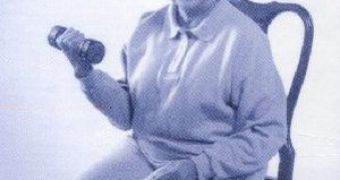Older people who want to lose weight should better consider getting trim by exercising on a regular basis than cutting on calories, advise experts at the Washington University. A recent study carried out by a team of researchers at the University pointed out the fact that shedding extra kilos by taking up a moderate physical effort program is the most recommended for people in their 50's and 60's because this method also helps them preserve their muscle mass, strength and ability to cope with physical effort. On the other hand, elders who take up low-calorie diets are more likely to experience loss of muscle mass and physical strength, even if they may lose the same amount of weight.
Lead author of the study Edward Weiss, Ph.D., Assistant Professor of Nutrition and Dietetics at Saint Louis University's Doisy College of Health Sciences stated: "Exercise-induced weight loss provides the additional benefit of improving physical performance capacity. If push comes to shove and somebody wants to know if they should diet or exercise to lose weight, I would suggest exercise, provided they are willing to put in the extra time and effort and not offset the gains they make by eating more."
"In addition, once a person loses weight, his or her muscles don't have to work as hard at everyday movements, such as rising from a chair, walking up steps or getting out of a car. Because they're carrying a lighter load, less demand is placed on them," the researcher said.
The study was conducted on 34 subjects with ages ranging from 50 to 70 and body masses between 23 and 30, therefore, from the high end of normal body weight to overweight. The 34 participants have been randomly assigned to two groups - the diet group and the exercise group. Subjects were supposed to cut calorie consumption by 16%, respectively burn 16% more calories during the first 3 months of the trial and then go on to cut, respectively burn 20% of calories in the next 9 months.
Overall results of the research showed that participants in both groups lost about the same amount of body weight, namely between 9 and 10% of their total body weight. However, those in the exercise group had more to 'gain', as their body strength improved and their muscle mass increased.
The team of researchers concluded that if exercising is most recommended in weight loss programs adopted by elderly people, this does not mean that the benefits of low-calorie diets should be underestimated. Also, individuals who take up exercising programs should not live under the long impression that they may consume more calories than usual.
Dr. Weiss said: "It's important that dieting not be seen as a bad thing because it provides enormous benefits with respect to reducing the risk of disease and is effective for weight loss. Furthermore, based on studies in rodents, there is a real possibility that calorie restriction provides benefits that cannot be achieved through exercise-induced weight loss. A critical requirement for exercise-induced weight loss is that food intake does not increase."

 14 DAY TRIAL //
14 DAY TRIAL //